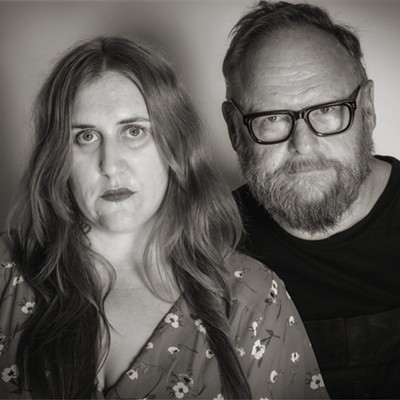We're the home of many a talented soul, but it's still great when you find out someone you went to high school with is in a band whose songs have been used on NPR. The One A.M. Radio, composed of Hrishikesh Hirway and former Tucsonan Jane Yakowitz, rose from a "bubble," as Yakowitz called it, of indie bands formed at Yale, in New Haven, Conn., while both Yakowitz and Hirway were students.
"For a school its size and its prestige, I guess, it has a lot more indie rock activity than one might think," said Yakowitz. (In another strange Tucson twist, Yakowitz and Hirway are friends with the fellow Yale grad who wrote the movie Porn 'n' Chicken, the soundtrack for which was written, as loyal Tucson Weekly readers may remember, by a band--Roma 79--consisting of some other former Tucsonans.)
The One A.M. Radio's softly haunting guitar and violin-based songs seem more suited to cool Connecticut--where both Hrishikesh Hirway and Jane Yakowitz went to school--than hazy Los Angeles, where they both live now. What makes the music more East Coast than West Coast is Hirway's carefully orchestrated melodies and intelligent, indirect lyrics--the kind of music you'd expect from Yale graduates. But after graduation and some time in Boston building up a fan base, Hirway and Yakowitz decided to explore the other coast, trading in humidity and snow for urban sprawl and palm trees.
"One reason we're here is because Hrishi wants to start doing music for movies," explained Yakowitz; another reason is so that Yakowitz could attend law school at UCLA. "It kind of makes sense because sometimes the music has a cinematic feature anyway, especially the instrumentals."
In fact, Yakowitz first began playing violin with Hirway on a song Hirway wrote for a short film he made for his senior thesis.
"That little collaboration we did ended up becoming a One A.M. Radio song, because we ended up liking it so much," said Yakowitz. "Then I just ended up being on more and more songs as time progressed, and now I'm on pretty much all of them.
"I met (Hirway) after he'd been playing solo for about a year ... He knew my roommate; he knew that I played violin. It's a small enough school that we became friends through similar interests. We also both studied photography, so we were always in the darkroom. That sounds naughty."
Hirway had been playing solo as the One A.M. Radio for about a year before adding Yakowitz to the lineup. The One A.M. Radio has released several singles and split 7-inch singles with other East Coast area musicians like Tracy Shedd, the Wind Up-Bird and Ted Leo and the Pharmacists, on Hirway's own labels, Garbage Czar and Translucence. Their first full-length, The Hum of the Electric Air, was released last year on Translucence. The record managed to do more than just hum, however; CMJ called it "mope core at its best," and someone at Punk Planet wrote, "Passivity is barely an option in listening to this record; every groove puts a hold on the heart." Two songs appeared as background music on NPR, which Yakowitz and Hirway found out about through a friend.
"One of my friends at law school told me that they played it," explained Yakowitz. "He was listening. It's really weird that he knew our songs well enough to, like, recognize it on NPR. I didn't know this guy very well, but he thought it was fascinating that a law student could also be in a band, because most people think that they don't have time."
Yakowitz and Hirway do all of their recording at home, using a digital 8-track and Pro Tools to add drums and other textures to the songs. Hirway's earlier One A.M. Radio songs--pre-violin--are quieter, less-layered and more somber; with the addition of another instrument and more technological flexibility, the songs are able to stretch from "sleepy low-fi lullabies," as Hirway describes them, to complex and melodic electronica. From sea, to shining sea.
"The sound has become broader; just by virtue of adding one other person, the range of the songs can change so much, in terms of dynamics and stuff like that," said Hirway. "They aren't just sleepy lullabies anymore."








